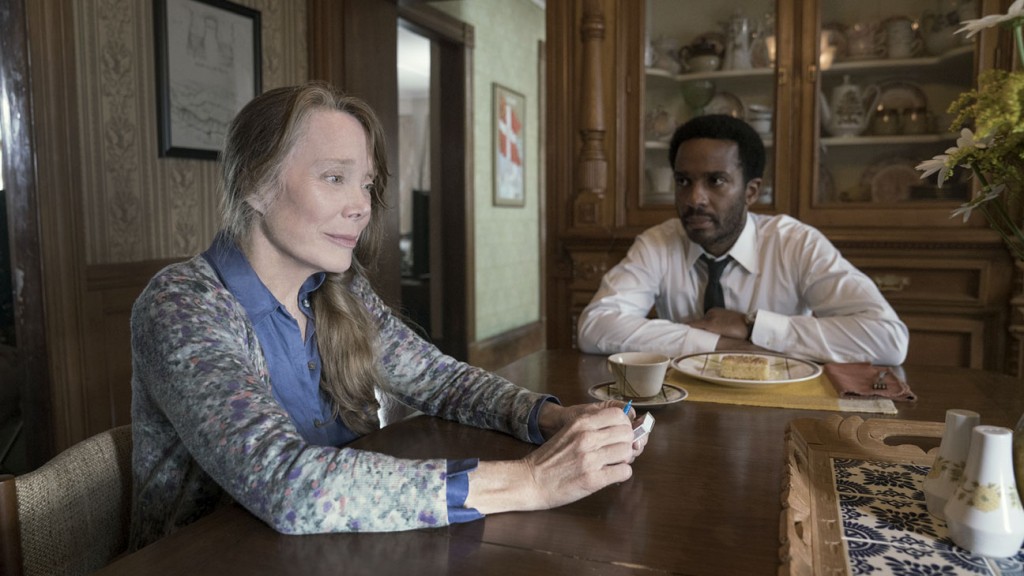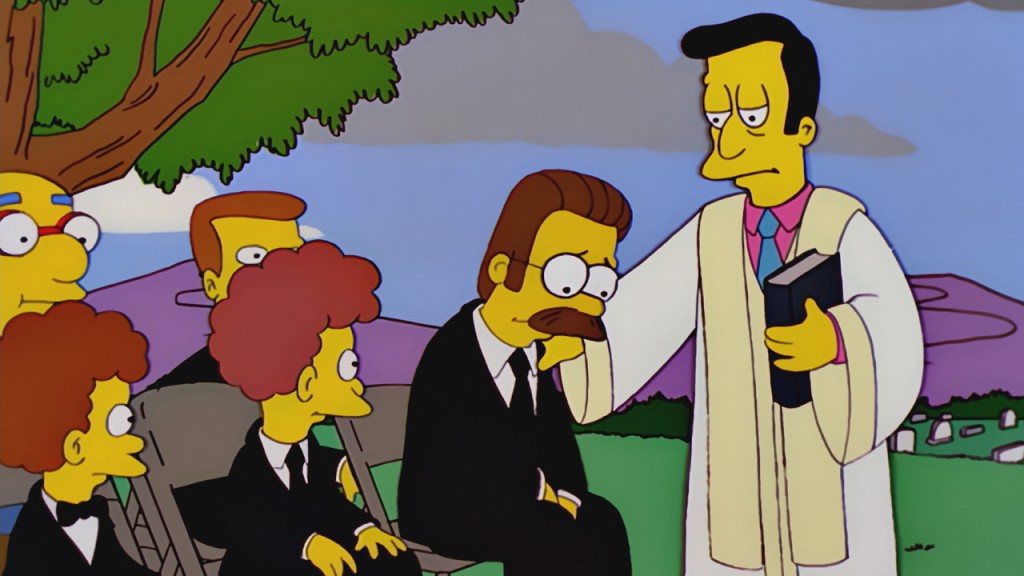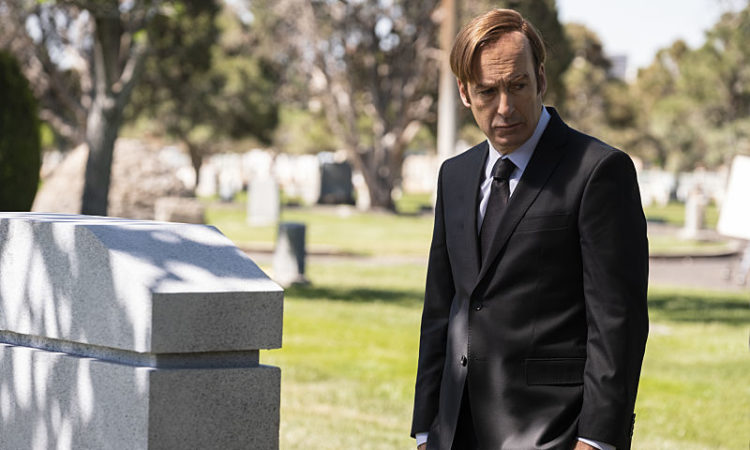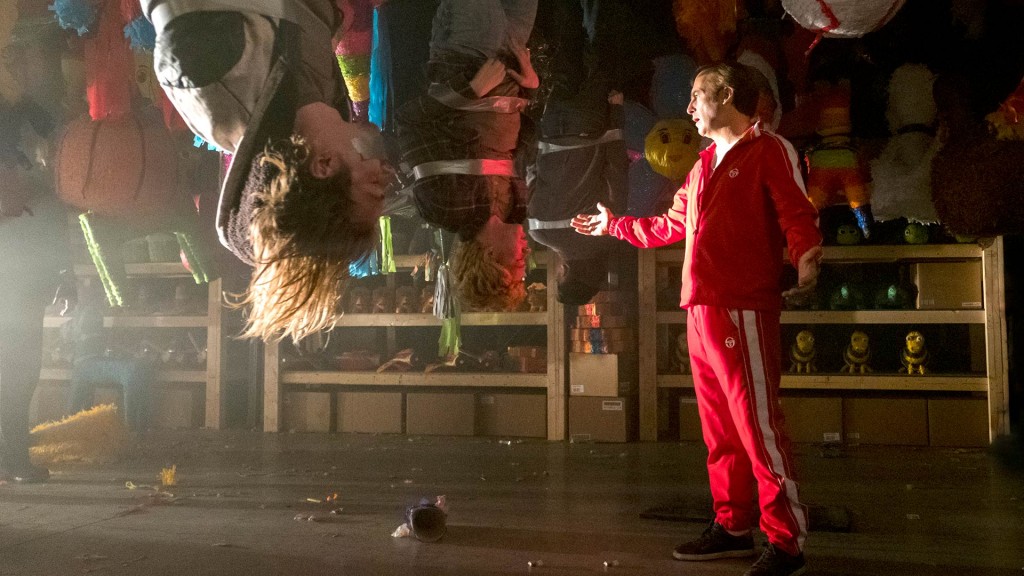-
Recent Posts
- Better Call Saul: There Are No Happy Endings between a “Rock and Hard Place”
- Black Widow Keeps It in the Family for Natasha’s Last Ride
- Loki Finds New Purpose in the Man behind the Mischief
- In its Debut, Star Wars: The Bad Batch Decides Whether to Obey or Rebel
- Nomadland: A Film Out of Time, For Our Times
Archives
Recent Comments
- Ed Clarke on Contact
- Matt on Why “The Frying Game” Is a Dark Horse Contender for The Simpsons’s Worst Episode Ever
- Lilly Dow on Contact
- Stacey on Veep’s Series Finale and the Hollowness of Getting What You Want
- Evan Jaocbs on Contact
Meta
Category Archives: Television
Nightflyers sees George R.R. Martin Head to Deep Space For Syfy

It’s 2093, and the Earth is dying. The crew of the Nightflyer, a bustling human colony ship, is leaving orbit and heading to “The Void” in hopes that they can save it. An alien ship housing a species referred to as “The Volcryn” (a confusing pronunciation for Star Trek fans) is traversing that space, and it’s a long shot, but they may hold the key to fixing our planet.
But the catch is twofold. First, the aliens have ignored all our attempts to contact them, so the humans have reluctantly resorted to enlisting a telepath to help their cause, who may or may not be able to hop on the aliens’ wavelength. Second, in this universe, telepaths are gravely mistrusted after a spate of vaguely-referred-to massacres. So when things start to go terribly wrong on the ship, and main characters and redshirts alike start to experience haunting hallucinations, that mistrust only grows. It quickly becomes apparent that this mission may be doomed before it ever really starts.
Posted in Other Prestige Dramas, Television
Tagged George R.R. Martin, Science Fiction, TV Reviews
Leave a comment
The Simpsons Kills Off Maude, But Saves Ned in “Alone Again, Natura-Diddily”
The death of Maude Flanders on The Simpsons was a decision born of commerce, not of storytelling. A pay dispute between Fox and Maggie Roswell, who voiced Maude for the show’s first decade on the air, is the reason the series killed off Ned’s wife. And it shows.
As I discussed on The Simpsons Show Podcast, her death veers somewhere between “cartoon gag” and “afterthought.” In fairness, Maude was never one of the show’s most prominent or interesting characters. While one could fault the writers’ room for not fleshing her out more, particularly on a series where well-developed female characters are vastly outnumbered by their guy counterparts, the fact is that by the show’s eleventh year, all we really knew about Maude is that she was religious, provincial, and a bit of a stick in the mud.
Posted in Television, The Simpsons
Tagged Death, Episode Reviews, Maude Flanders, Ned Flanders, The Simpsons S11E14, The Simpsons Season 11
Leave a comment
Better Call Saul: In “Winner” Jimmy McGill Fakes His Grief Until It Changes Him
This whole season, Kim Wexler, and the audience, have been waiting for Jimmy McGill to truly deal with his brother’s death, to genuinely confront Chuck’s passing, rather than try to move on as though nothing had happened. From the season premiere, where Jimmy brushed off Howard’s tortured confession with an unbothered air, to last week’s tantrum over being denied his reinstatement, we’ve seen Jimmy do nothing but sublimate his feelings about his brother’s death. We’ve seen him repress them, run from them, and act out because of them, but never really face them head on.
The Walking Dead Tries to Rebuild the World with “A New Beginning”
I spent so much of The Walking Dead’s last major arc wondering “why don’t our heroes just take out Gregory?” Sure, so much of that arc was, yet again, about the battle for the soul of their community, a theme illustrated through choices about whether to spare people in order to remain good Samaritans or to hurt and harm and kill them like The Saviors, because that’s what it takes to beat The Saviors. Not executing Gregory, not sending him out to fend for himself, was meant not just as a sign of mercy, but as a sign that the good guys were morally better than the bad guys.
But good lord, surely at some point after he’s tried to sell you out to those same bad guys, after he’s tried to sow chaos and mistrust for you and your group, after he’s proven to be nothing but a unredeemable heel through and through, you rid yourself of the guy one way or another. Beyond a certain point, practicality has to win out, and someone who practically goes out of his way to cause trouble and threaten your life and the lives of the people you care about has to go.
Better Call Saul Waits for the Other Shoe to Drop in “Wiedersehen”
I miss the approach — popularized by The Wire and used by series as distinct as BoJack Horseman — of series putting their major fireworks in the penultimate episode of the season rather than the finale. It gives the show and the audience a full episode to recover and process all the major events of the season. And it helps avoid the sense in that second-to-last episode that you’re getting more setup than payoff ahead of the series pulling the trigger on its biggest developments.
That’s the problem with “Wiedersehen”, a perfectly good but not outstanding episode of Better Call Saul. It’s not as though there’s nothing happening in the episode. Lalo Salamanca makes overtures to Gus. Werner makes a daring escape from his gilded cage. And Jimmy not only faces a denial of his application reinstatement, but in his anger and disbelief, manages to sabotage his relationship with Kim, which had finally seemed to be on the mend. But all of this feels more like setting the table for bigger resolutions to come in the finale than anything full or complete in the episode itself.
Better Call Saul Still Manages to Surprise and Delight Us in “Coushatta”
Better Call Saul is a show that zigs when you expect it to zag. The series makes its bones as a tragedy, where the events are all the more sad, all the more pitiable, because (most of) the audience knows the unfortunate ends waiting for the show’s main characters. And yet, the series still has an impressive ability to surprise, to delight, to lead you down one path and make you think you know where things are headed, only to take a sudden left turn toward something you might never have expected.
Better Call Saul: The Slow Burn Threatens to Bring Down Jimmy and Kim in “Something Stupid”
I’ve known the evenings, mornings, and days alone,
I have measured out my life in Mesa Verde awards and burner phones.
With my sincerest apologies to T.S. Eliot, it’s amazing how Better Call Saul can move so slowly and then so quickly in the same season, without missing a beat. It’s hard to know exactly how much time has elapsed in the show so far, but this season picked up right where the last one left off and has, more or less, crept along in the aftermath of Chuck’s death and Hector’s “accident” ever since.
That is, until now. If the last episode stood out for how it seemed to set Jimmy and Kim on diverging trajectories, “Something Stupid” takes that idea up a notch, with a cold open set to the famed Sinatra melody that provides the episode’s title. The series taps into its unrivaled ability to craft montages, depicting the passage of time via unwrapped statuettes, filing cabinet labels, and holiday sale signs. But the show goes a step further with its formal creativity, using a well-placed split screen to show how both Kim and Jimmy are flourishing in their new lives, but also how those lives are slowly but surely pulling them further and further apart.
BoJack Horseman and When Life and Death Don’t Fit the Rules of Television

CAUTION: This article contains major spoilers for Season 5 of BoJack Horseman.
There was a random forum post the other day, asking when movies stopped showing characters getting into elevators. Well, it was more complicated than that, but that was the gist. Movies used to show a character leaving a room, walking down the hallway, getting into a car, stopping for gas, arriving at the next location, etc. etc. etc. In the early years of film, that’s how you transitioned from one scene to another.
Then, Jean-Luc Godard happened. And suddenly movies just cut past all that stuff. A character would start in one room and then, boom, be someplace else, with a brief establishing shot or a quick dissolve or little more than a different backdrop to let you know what’s going on. Movies eventually came to trust their audiences to understand that the character on screen did all that boring transition stuff in the meantime, without needing to see it.
Castle Rock’s First Season Offers the Same Old Tiresome Excesses of High Class Genre Fare

CAUTION: This article contains major spoilers for Castle Rock.
When the first season of Netflix’s Daredevil came out, it felt like the series fulfilled an unmet need. The show had its problems, even in its promising first year, but it did things differently than other live action superhero shows at the time. The series had something on its mind. It had production values and grimy visuals and creatively-staged fights. It was far from flawless, but its quick success made it seem like the herald of a new phase of genre television, one that aimed for something a little deeper, a little darker, and a little realer than what we’d had before.
Well maybe it’s time to send that herald back from whence it came. As I discussed on The Serial Fanatacist podcast, Castle Rock doesn’t directly borrow much, if anything, from Daredevil, but it’s part of the same wave of prestige-aping, navel-gazing genre shows whose reach far exceeds their grasp. While briefly novel, this sort of take on geek-approved material has worn out its welcome amid the onslaught of shows that know enough to gesticulate toward deeper themes and move the camera around in faux-portentous montages, but never really master the trade, let alone the depth of character or storytelling that could make those badges of seriousness legitimately meaningful.
Posted in Other Prestige Dramas, Television
Tagged Castle Rock, Genre Television, Horror, Season Reviews, Stephen King
Leave a comment
Better Call Saul Sets Jimmy and Kim on Different Paths in “Piñata”
Jimmy and Kim are on different paths; that’s been clear for a while now. But the cold open in “Piñata” makes it literal. The episode starts with a flashback to the halls of HHM, at a time when Jimmy is a gregarious mailroom clerk and Kim’s a precocious law student. Even then, the two share a rapport, but also have obvious differences.







